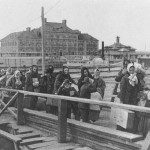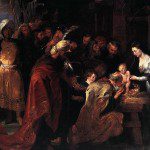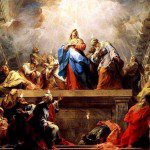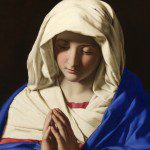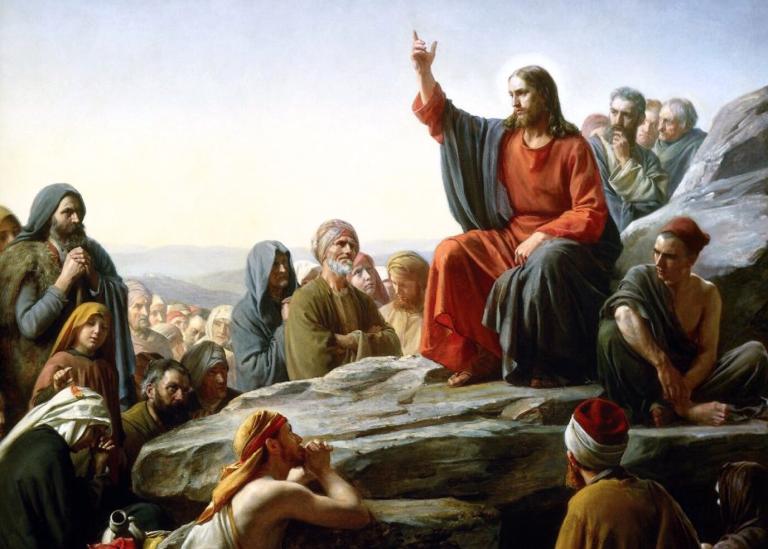
Generally, I am much relieved when it is January 2. More and more as I grow older, the holidays seem to me to be something to have over. This is because they have become a frenetic rush of activity that there is never enough time to get done: stuff to buy; stuff to cook; places to be; traffic to fight and drivers to curse; lines of crazed shoppers to endure, as though I should be there myself; music to roll my tired and ticked off eyes at and say, “If I hear that stupid Feliz Navidad just one more time!” decorations of stuff to put up; a cat to control when, under an impulse not to be denied, he jumps into the tree as one possessed and drags tinsel from room to room. When it is January 2 I can stop; when it is January 2 I can rest.
QUI GEMIT IN EXSILIO
In the Gospel reading for the first Sunday of Advent, Jesus refers to a spiritual discipline I seldom hear anyone talk about.
But as the days of Noah were, so shall also the coming of the Son of man be. For as in the days that were before the flood they were eating and drinking, marrying and giving in marriage, until the day that Noe entered into the ark, and knew not until the flood came, and took them all away; so shall also the coming of the Son of man be. Then shall two be in the field; the one shall be taken, and the other left. Two women shall be grinding at the mill; the one shall be taken, and the other left. Watch therefore: for ye know not what hour your Lord doth come. (Matt. 24:37-42)
Sacred Scripture is full of references to the discipline of “watching”: “Blessed is the man that heareth me, watching daily at my gates, waiting at the posts of my doors” (Prov. 8:34); “What I say unto you, I say unto all: Watch” (Mark 13:37); “Blessed are those servants, whom the Lord when he cometh shall find watching” (Luke 12:37); “But in all things approving ourselves as the ministers of God, in much patience, in afflictions, in necessities, in distresses, in stripes, in imprisonments, in tumults, in labours, in watchings, in fastings” (2 Cor. 6:4-5); “Pray always with all prayer and supplication in the Spirit, and watch thereunto with all perseverance” (Eph. 6:18).
To “watch” means more than to stare or look; watching actually refers to the discipline of staying up all night, typically in prayer, waiting, and caution. The Bible constantly warns us against the danger of being found asleep. “Be sober, be vigilant; because your adversary the devil, as a roaring lion, walketh about, seeking whom he may devour” (1 Pet. 5:8) But while Peter warns us to constantly be on the alert for the attacks of the devil, he also means for us to be watchful for the promised coming of the Lord: “But the God of all grace, who hath called us unto his eternal glory by Christ Jesus, after that ye have suffered a while, make you perfect, stablish, strengthen, settle you” (1 Pet. 5:10). I used to imagine that if I stayed up all night on Christmas Eve, I would catch Santa Claus when he showed up. My parents spoiled it by telling me he would not come unless I were asleep. But we should have such anticipation with Christ—not to fall asleep, lest we miss Him when He comes.
It is the purpose of Advent to get us to stop and look and wait. It is the purpose of Advent to remind us that Christ has come and is coming again and that we should watch for Him in eager anticipation. And that we should be watchful, as well, of our own sinfulness, and repent. To prepare the way of the Lord means to prepare our ways for the Lord.
PRIVATUS DEI FILIO
But how do we do that when there is so much other stuff to do and we are busy?
Considering my own habits, I am perhaps not the best person to be asked that question, or to answer it. But maybe an observation would help: There has not been a generation that has not felt itself too busy for watching. If Christ told His disciples to watch, it was because they needed to be told. Christ tells us the same thing He told them; He does not say, Well, this generation is more burdened than before, therefore it can be excused in its busyness. If we think the disciples were somehow different in their tattered robes and luxurious freedom for spiritual things, we are telling ourselves a lie.
My conviction is—and I say this as much to myself—that our lives are busy and full of things because we have made them busy and full of things. We have filled up our retail outlets and homes and crowded out the Lord; and then we complain that we have no time for Him, no time to stop, no time to watch. We have done that. And if we have done that, we can resist that.
It was appalling when crowds gathered outside stores for their opening on Black Friday, and then pushed over each other to get in; it was appalling when two women were filmed beating each other up over who knows what. The reason these things happen is because our culture values material things over spiritual ones. But even those of us who resist such a pitch of madness can still stop and consider to what extent Advent and Christmas have become a list of things for us to buy and things for us to do. The reason we give gifts at Christmas—or at least the reason we should—is not to grow in material wealth but to symbolize the gifts the wise men brought Christ.
Perhaps one way to declare our freedom is to give no one more than three gifts and to exchange them on Epiphany. If we did that, we could hold off on putting up any decorations until Christmas Eve, buy all our gifts after January 1 when the stores are empty, exchange them on January 6, and spend Advent properly—in prayer, in repentance, fasting, and in watching.
It is a thought I doubt will catch on.
VENI! VENI!
Once Israel was in exile, and it is still in exile. In its exile it longed for Immanuel—the presence, not of a king, not even of a homeland, but of God. For the only real exile is exile from God.
And so the experience of salvation is mainly an experience of waiting. And the discipline of watching refocuses us on what we really lack. The discipline of repentance refocuses us on who we really are. The discipline of prayer refocuses us on who we are meant to be and to whom we really belong. We do not really need to fill our homes with things, if it is our souls that are empty. We do not really need to decorate our homes with frippery, if it is our God we need to adorn.
He came and He is coming again and truly we long for Him and for no other. If He were coming tonight, would you not drop all else and rush out to meet Him with joy? But would you not want to have been prepared of heart first?
Veni! veni!
***
If you like the content on this blog, your generous gift to the author helps to keep it active. I remember all my supporters in my Mass intentions each week.

